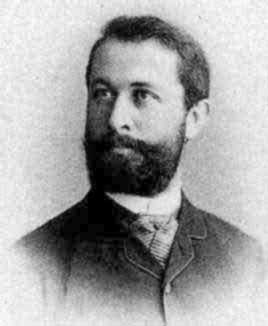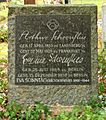Arthur Moritz Schoenflies facts for kids
Quick facts for kids
Arthur Moritz Schoenflies
|
|
|---|---|
 |
|
| Born | 17 April 1853 Landsberg an der Warthe, Brandenburg, Prussia
|
| Died | 27 May 1928 (aged 75) Frankfurt am Main, Hesse-Nassau, Germany
|
| Alma mater | University of Berlin |
| Known for | Schoenflies problem Jordan–Schoenflies theorem Schoenflies notation Schoenflies displacement |
| Spouse(s) | Emma Levin (1868–1939) |
| Children | Hanna (1897–1985), Albert (1898–1944), Elizabeth (1900–1991), Eva (1901–1944), Lotte (1905–1981) |
| Scientific career | |
| Fields | Group theory, crystallography, and topology |
| Academic advisors | Ernst Kummer Karl Weierstrass |
| Influences | Felix Klein |
Arthur Moritz Schoenflies (born April 17, 1853 – died May 27, 1928) was a German mathematician. He is known for his important work in group theory, especially how it applies to crystallography. He also made big contributions to a field of math called topology.
Contents
Early Life and Education
Arthur Schoenflies was born in a place called Landsberg an der Warthe. Today, this city is known as Gorzów in Poland. He was born on April 17, 1853.
He studied at the University of Berlin from 1870 to 1875. He learned from famous mathematicians like Ernst Kummer and Karl Weierstrass. Another important person who influenced his work was Felix Klein.
Career and Contributions
After finishing his studies, Schoenflies earned his doctorate degree in 1877. A doctorate is the highest university degree. In 1878, he started working as a teacher at a school in Berlin. Later, in 1880, he moved to Colmar to continue teaching.
Schoenflies made many contributions to mathematics. He was especially known for:
- Group Theory and Crystals: He helped show how group theory, a way of studying symmetry, could be used to understand the structure of crystals. This is called crystallography.
- Topology: He also worked in topology, which is a branch of mathematics that studies shapes and spaces.
The Schoenflies Problem
One of his famous challenges was the Schoenflies problem. This problem asks to prove that a certain type of shape, like a sphere, always encloses a "ball" or a solid space, no matter how it's bent or twisted. It sounds simple, but it's actually a very tricky question in math!
Writing for Klein's Encyclopedia
Schoenflies often wrote articles for a big math encyclopedia created by Felix Klein. He wrote about different topics, including:
- Set Theory: This is about collections of objects.
- Kinematics: This is the study of motion.
- Projective Geometry: This is a type of geometry that deals with how objects appear when projected onto a surface.
Arthur Schoenflies was also the great-uncle of a famous writer named Walter Benjamin.
Family Life
In 1896, Arthur Schoenflies married Emma Levin. They had five children together: Hanna, Albert, Elizabeth, Eva, and Lotte.
Images for kids
See also
 In Spanish: Arthur Moritz Schönflies para niños
In Spanish: Arthur Moritz Schönflies para niños
 | George Robert Carruthers |
 | Patricia Bath |
 | Jan Ernst Matzeliger |
 | Alexander Miles |


